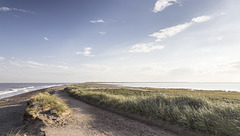Earthwatcher's photos with the keyword: Humber Estuary
Spurn groyne and large vessel
| 01 Oct 2020 |
|
|
A visit to Spurn Point 10
The east-facing beach of Spurn has a series of groynes, now mostly in disrepair. The object was presumably to try to limit sediment drift southwards to help keep the mouth of the Humber clear for shipping.
A large cargo vessel is moored in the estuary mouth, perhaps awaiting high tide before moving off?
Spurn Warren view NE
| 01 Oct 2020 |
|
|
|
A visit to Spurn Point 14
A view north-east from the grassy sand banks of Spurn Warren.
Spurn Warren view SW to lighthouses
| 01 Oct 2020 |
|
|
A visit to Spurn Point 15
The southern part of Spurn widens into the grassy sand banks of Spurn Warren. There are two lighthouses on Spurn; the newer 'High Lighthouse', painted black and white, was built 1893-95; the older 'Low Lighthouse' is visible to the right of centre.
More details here:
historicengland.org.uk/listing/the-list/list-entry/1083476
The High Lighthouse was taken out of service in 1985 and is now managed and opened for visitors by the Yorkshire Wildlife Trust.
Spurn High Lighthouse 1
| 01 Oct 2020 |
|
|
A visit to Spurn Point 18
There are two lighthouses on Spurn; the newer 'High Lighthouse', painted black and white, was built 1893-95; the older 'Low Lighthouse' is visible to the right of centre.
More details here:
historicengland.org.uk/listing/the-list/list-entry/1083476
The High Lighthouse was taken out of service in 1985 and is now managed and opened for visitors by the Yorkshire Wildlife Trust.
Spurn Warren view W to Grimsby
| 01 Oct 2020 |
|
A visit to Spurn Point 16
This is a view from the grassy sand bank of Spurn Warren across the Humber Estuary to Grimsby with its prominent Dock Tower.
Spurn High Lighthouse 3
| 01 Oct 2020 |
|
|
A visit to Spurn Point 20
There are two lighthouses on Spurn; this is the lantern turret of the newer 'High Lighthouse', which was built 1893-95.
More details here:
historicengland.org.uk/listing/the-list/list-entry/1083476
The High Lighthouse was taken out of service in 1985 and is now managed and opened for visitors by the Yorkshire Wildlife Trust.
Spurn north end view SW over the Spurn Neck
| 01 Oct 2020 |
|
|
|
A visit to Spurn Point 26
Looking south-west from the landward end of Spurn, over the narrow Spurn Neck (the high spring tide wash-over zone). Spurn Point itself, and the two lighthouses, are visible on the skyline towards the right.
Spurn Warren view E to wind farm
| 01 Oct 2020 |
|
|
|
A visit to Spurn Point 23
A view east from Spurn Warren, with the Humber Gateway Offshore Wind Farm visible on the horizon.
Spurn lighthouses view NE
| 01 Oct 2020 |
|
|
|
A visit to Spurn Point 22
There are two lighthouses on Spurn; the newer 'High Lighthouse', painted black and white, was built 1893-95; the older 'Low Lighthouse' is visible on the left.
The Lower Lighthouse', was built by engineer John Smeaton and completed in 1776. But by 1892, the structure was becoming cracked and unstable, and the new 'Upper Lighthouse' was constructed to replace Smeaton's light.
The black cylinder on the top of the Lower Lighthouse is a water tank, which has replaced the former lantern turret.
Spurn Lower Lighthouse
| 01 Oct 2020 |
|
|
A visit to Spurn Point 21
There are two lighthouses on Spurn; this is the older, 'Lower Lighthouse', which was built by engineer John Smeaton and completed in 1776.
By 1892, the structure was becoming cracked and unstable, and the new 'Upper Lighthouse' was constructed to replace Smeaton's light.
The black cylinder on the top is a water tank, which has replaced the former lantern turret.
Spurn High Lighthouse 2
| 01 Oct 2020 |
|
|
A visit to Spurn Point 19
There are two lighthouses on Spurn; this is the newer 'High Lighthouse', which was built 1893-95.
More details here:
historicengland.org.uk/listing/the-list/list-entry/1083476
The High Lighthouse was taken out of service in 1985 and is now managed and opened for visitors by the Yorkshire Wildlife Trust.
Spurn Chalk Bank view north 2
| 01 Oct 2020 |
|
A visit to Spurn Point 12
The western side of Spurn overlooks the salt marsh and mud flats: a haven for wading and migrating birds, which flock here to feed.
The white Chalk boulders originate from barge-loads of Chalk emplaced on the west side of the spit during the period 1851 - 1857 following a series of storm surge breaches.
Spurn Chalk Bank view WNW to Immingham
| 01 Oct 2020 |
|
A visit to Spurn Point 13
The western side of Spurn overlooks the salt marsh and mud flats: a haven for wading and migrating birds, which flock here to feed.
On the far side of the Humber Estuary are the industrial complexes and refineries between Grimsby and Immingham docks.
Spurn Chalk Bank view north 1
| 01 Oct 2020 |
|
A visit to Spurn Point 11
The western side of Spurn overlooks the salt marsh and mud flats: a haven for wading and migrating birds, which flock here to feed.
The white Chalk boulders originate from barge-loads of Chalk emplaced on the west side of the spit during the period 1851 - 1857 following a series of storm surge breaches.
Jump to top
RSS feed- Earthwatcher's latest photos with "Humber Estuary" - Photos
- ipernity © 2007-2025
- Help & Contact
|
Club news
|
About ipernity
|
History |
ipernity Club & Prices |
Guide of good conduct
Donate | Group guidelines | Privacy policy | Terms of use | Statutes | In memoria -
Facebook
Twitter














